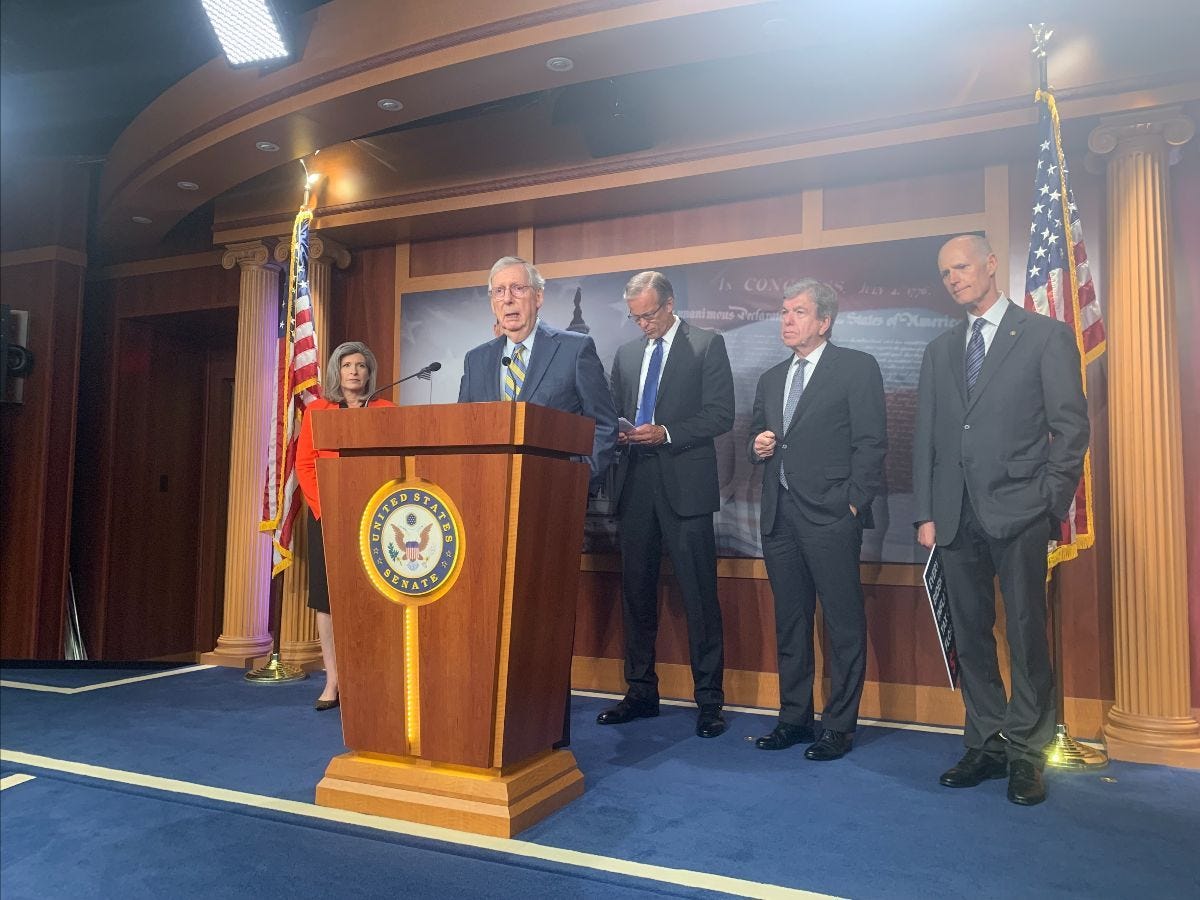As goes McConnell...
Once a proud obstructionist, Mitch McConnell is on a bit of a bipartisan streak.
by Gabe Fleisher
Good morning! It’s Wednesday, September 28, 2022. Election Day 2022 is 41 days away. Election Day 2024 is 769 days away.
I’m leading off this morning with a look at the curious case of Mitch McConnell, as the famed obstructionist has become something of a weathervane for bipartisanship in the Biden era.
This story ties together a number of strands I’ve been following closely in this newsletter: the recent flurry of bipartisan legislating, but also the changing power dynamics in Washington, D.C.
As always, my hope isn’t to focus on personality for personality’s sake, but as a byway to understanding the latest policy developments — and to take you behind the scenes here in Washington, so you know who to watch and how to follow what’s really going on.
If you enjoy Wake Up To Politics, I hope you’ll consider forwarding this email to a friend and encouraging them to subscribe.
As goes McConnell...
A 90-minute stretch at the Capitol on Tuesday revealed the enduring power of Senate Minority Leader Mitch McConnell (R-KY).
At around 3:20pm, McConnell took to the Senate floor to make two announcements: he would oppose a continuing resolution (CR) to keep the government open if a permitting reform proposal by Sen. Joe Manchin (D-WV) was attached, and he would support bipartisan efforts to reform the 135-year-old Electoral Count Act.
Within an hour and a half, the Manchin proposal had been stripped out of the CR and the Electoral Count Act reform bill had sailed through committee.
This pair of developments reflect a larger truth about the flurry of bipartisan bills that have passed through Congress in the past two years. When these cross-party efforts have had McConnell’s support, they’ve passed. When they haven’t, the legislation has been doomed to failure.
Although he was caricatured as the “Grim Reaper” of the Senate in the Obama years, McConnell has recently joined the more moderate members of his caucus to back bipartisan infrastructure, gun control, and chip manufacturing packages.
In each case, he was in a minority of Senate Republicans to vote “yea” on the legislation in question. But when efforts with bipartisan support have collapsed this Congress, such as a bill to create a national commission to investigate January 6 or Manchin’s permitting reform push, McConnell has always been in opposition.
These votes showMcConnell’s sway within the Senate — but, more than that, they show his finely-tuned legislative antenna. In the same way that President Biden has reliably positioned himself at the median of the Democratic Party for decades, McConnell is acutely aware of where his members are at any given moment and bases his votes accordingly.
Notably, on Tuesday, he did not come out for the Electoral Count Act reform until it had already notched 10 GOP supporters (enough to advance) and he did not oppose permitting reform until it was already clear it would fail. (However, his hand is ever-present behind the scenes: he has been signaling his support for updating the Electoral Count Act for months, and he was reportedly whipping against permitting reform.)
It is something of a chicken-and-an-egg question, then. Do bipartisan bills succeed because McConnell supports them, or does McConnell support them because they’re bound to succeed? It’s probably a bit of both. Like other congressional leaders, McConnell has been known to “lead from behind” at times.
For example, a new book coming out next month reveals how close McConnell came to voting for former President Trump’s conviction during his second impeachment trial last year. But when it was clear the bulk of his Senate Republicans were against him, McConnell backed down.
“McConnell stopped short of perhaps the one thing that may have made a difference,” the book notes. “He never actually encouraged his colleagues to convict.” Indeed, McConnell told Republicans to “vote their conscience,” a tactic he has taken on other bipartisan votes this year — allowing him to end up on the winning side without having to go out on a limb to whip any of his colleagues to join him.
Still, McConnell’s support has clearly been at least part of the reason why the Biden presidency has managed to pull off so many bipartisan successes, which begs the question of why he’s changed tacks so completely from his obstructionism of the Obama era.
Is it because of his personal relationship with Biden, versus Obama’s legendary aloofness? Is his eye on his legacy, as he approaches the record of longest-serving Senate floor leader? Is he bowing to the wishes of his rank-and-file, who are hoping to get something done after two presidencies without much bipartisanship?
Another theory is that McConnell is trying to prove to Sens. Manchin and Kyrsten Sinema (D-AZ) that the Senate still works even with the filibuster intact, hoping not to give them a reason to destroy it. Just this week, McConnell showered praise on Sinema in a joint appearance, calling her the “most effective first-term senator” he’s seen and applauding her stance on the filibuster.
No matter his motivation, the events of Tuesday — and the votes of the last year — reinforce McConnell’s position as a useful barometer to watch when wondering if the Senate might get something done.
An upcoming vote to pay attention to will be on the House-passed bill to legalize same-sex marriage. When I asked McConnell in July if he’d support it, he declined to say. He’s remained silent on it ever since, as its sponsors have struggled to cobble together 10 Republican backers.
If his recent streak is any clue, what McConnell does will be a key clue for whether it has any hopes of advancing.
In the meantime, Manchin — the Kentucky Republican’s sometimes friend, sometimes foe — is still searching for a way forward on his scuttled permitting reform plan.
Later Tuesday, the West Virginian could be seen huddling with McConnell on the Senate floor, trying once again to secure his all-important blessing.
What else you should know
➞ What’s next for the CR and ECA reform? With Manchin’s permitting reform provision taken out, the continuing resolution advanced in the Senate by a 72-23 vote on Tuesday. The CR should now easily pass through both chambers of Congress by Friday’s shutdown deadline.
As for permitting reform, Manchin has begun talking to Republicans about possibly attaching a compromise version to the two additional must-pass bills left this year: the annual defense policy package and the omnibus appropriation bill.
Meanwhile, the bipartisan Senate bill to update the Electoral Count Act advanced in a 14-1 committee vote on Tuesday. Sen. Ted Cruz (R-TX) cast the sole vote in opposition. The measure isn’t expected to receive a final vote until the lame-duck session, after the midterms. It is likely to win out over a competing House version that had been introduced, after McConnell said Tuesday that the Senate iteration is the only one he would support.
➞ The January 6th committee postpones. The House panel had planned to hold its highly anticipated last hearing today, but committee leaders scrapped the session due to Hurricane Ian. The hearing will be rescheduled to a later date.
The panel was reportedly worried that the hurricane would distract from news coverage of the hearing; additionally, one of the committee’s members, Rep. Stephanie Murphy, is from Florida.
➞ Speaking of Hurricane Ian, the Category 3 cyclone is nearing Florida after knocking out electricity across all of Cuba on Tuesday. Some power has begun to be restored, although Havana and other regions remain in the dark. President Biden spoke to Gov. Ron DeSantis (R-FL) on the phone Tuesday about the storm, hours after the rising GOP star said publicly that he hadn’t heard from the president.
Three more headlines to know this morning:
“Newest addition to Trump’s legal team sidelined in Mar-a-Lago search case” CNN
“Facebook says it took down China-based accounts that tried to interfere in the U.S. midterms” NBC News
“Texas Attorney General Ken Paxton fled his home to avoid being served with subpoena, court record says” Texas Tribune
And two pieces I recommend:
“The Dollar Is Strong. That Is Good for the U.S. but Bad for the World.” New York Times
“How Democrats Gave Ron DeSantis a Pass” Time Magazine
Today at a glance
All times Eastern. Click on an event’s time to watch it.
AT THE WHITE HOUSE: President Biden will receive his daily intelligence briefing (8 am), deliver remarks at the White House Conference on Hunger, Nutrition, and Health (10 am), deliver remarks at an event celebrating the Americans with Disabilities Act (ADA) in honor of Disability Pride Month (11 am), receive a briefing from his senior economic team on global economic developments (1:15 pm), and participate in a Democratic Governors Association fundraiser (7 pm).
Vice President Harris is in Japan. Earlier this morning, she hosted a roundtable discussion with Japanese semiconductor executives, received a briefing and met with service members on board the USS Howard, and delivered remarks on the U.S.’ work with allies in the region.
White House press secretary Karine Jean-Pierre will hold her daily press briefing (12:30 pm).
First Lady Jill Biden will also deliver remarks at the ADA event (11 am). Later, she’ll deliver remarks after meeting with military families in Alexandria, Virginia (12 pm).
Second Gentleman Emhoff will also speak at the White House Conference on Hunger, Nutrition, and Health (4:15 pm) and then moderate a panel there with young advocates leading efforts to combat hunger (4:30 pm).
ON THE HILL: The Senate will convene (10 am) and resume consideration of H.R. 6833, the legislative vehicle for the continuing resolution (CR) extending government funding through December 16. Votes are possible, but none are scheduled. The chamber will recess for part of the afternoon for the weekly party lunches.
The House will convene (12 pm) and vote on 32 pieces of legislation, including measures on tourism and food security for veterans, as well as Senate-passed bills on artificial intelligence and human trafficking.
IN THE COURTS: The Supreme Court will meet for the first conference of its new term. It will be Justice Ketanji Brown Jackson’s first conference since joining the court.
Before I go...
Let’s end on a lighter note. A California fifth-grader, Andres Valencia, is taking the art world by storm.
Paintings by Valencia, 10, are routinely selling around the world for six-figure sums, including a recent $230,000 sale in Italy. His surrealist-style works have earned him the nickname “Little Picasso.”
“His art career began at 4,” according to the New York Times, “when his parents noticed that he spent hours in their San Diego dining room, sketching a painting by the graffiti artist Retna, one of his father’s former clients.”
More than $300,000 from his sales have been donated to amfAR, an AIDS charity, Box of Hope, a children’s charity, his parents said.
Read more from the New York Times.
That’s it for today. If you enjoy Wake Up To Politics, it’s always appreciated if you donate to support the newsletter or buy some merch. Or if you tell your friends and family to sign up at wakeuptopolitics.com.
If you have any questions or feedback, feel free to email me: my inbox is always open.
Thanks for waking up to politics! Have a great day.
— Gabe







